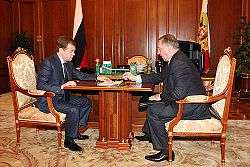Transneft
 | |
Native name | Транснефть |
|---|---|
| Public (OAO) | |
| Traded as | MCX: TRNFP |
| Industry | Oil and gas |
| Founded | 1992 |
| Headquarters | Moscow, Russia |
Key people |
Nikolay Tokarev (Chairman) Alexander Novak (Chairman of the Board of Directors) |
| Services | Pipeline transport |
| Revenue |
|
|
| |
| Owner | Government of Russia (100%) |
Number of employees | 106,000 (2008) |
| Subsidiaries | Transnefteproduct |
| Website |
www |
Joint Stock Company Transneft (Russian: Транснефть) is a Russian state-owned transport monopoly, the largest oil pipeline company in the world. JSC "Transneft" is operating over 70 thousand kilometers of trunk pipelines.[1] It transports about 90% of oil and 30% of oil products produced in Russia, in addition to considerable volumes of crude hydrocarbons from the CIS countries. The company is headquartered in Moscow and led by Nikolay Tokarev.
History
Oil Transporting Joint-Stock Company Transneft was established by Decree of the Government of the Russian Federation No. 810 dated 14 August 1993 in pursuance of Decree of the President of the Russian Federation No. 1403 dated 17 November 1992. The founder is the Government of the Russian Federation. Transneft, JSC was registered by the Moscow Registration Chamber on 26 August 1993, certificate No. 026.800.[2]
Transneft's core business
- pumping, coordination and management of pipeline transportation of oil and oil products via trunk pipelines across Russia and abroad.
- comprehensive development of the oil trunk pipeline network and other pipeline transport facilities
- coordination of steps for solution of scientific and technological progress issues in pipeline transportation, introduction of new technologies and materials.
- cooperation with international pipeline transportation companies for the purposes of oil and oil products transportation in accordance with intergovernmental agreements.
- raising funds for development of production capacities, expansion and rebuilding of Transneft subsidiaries’ facilities.
- organization and provision of environmental safety measures at the locations of trunk pipeline transportation facilities.
Management

Board of Directors (As of July 2014):
- Matthias Warnig (Chairman of the Board of Directors of Transneft, JSC)
- Nikolay Tokarev (Chairman of the Management Board, the President of Transneft, JSC (professional attorney)
- Oleg Viugin
- Mikhail Grishankov
- Valery Katkalo
- Aleksandr Misharin
- Kirill Molodtsov
Management board (As of July 2014):
- Nikolay Tokarev (Chairman of the Management Board, the President of Transneft, JSC)
- Maksim Grishanin (First Vice-President of Transneft, JSC)
- Yury Lisin (First Vice-President of Transneft, JSC)
- Mikhail Barkov (Vice-President of Transneft, JSC)
- Boris Korol (Vice-President of Transneft, JSC)
- Pavel Revel-Muroz (Vice-President of Transneft, JSC)
- Vladimir Rushailo (Vice-President of Transneft, JSC)
- Aleksey Sapsay (Vice President of Transneft, JSC)
- Igor Katsal (Deputy Vice-President – Director of the Oil Transportation, Metering and Quality Department of Transneft, JSC)
- Yury Kritsky (Director of the Oil and Oil Products Movement Department of Transneft, JSC)
Reliability and safety
Transneft’s key priorities include protection of life and health of the Company’s employees, provision of safe labor conditions and prevention of emergencies at dangerous facilities. The goals and objectives in the field of occupational health and labor safety are determined by "The Policy of JSC "Transneft" in the Field of Occupational Health" and "The Policy of JSC "Transneft" in the Field of Labor Safety".
Striving to achieve these goals, Transneft adheres to the following principles:
- compliance with the requirements of the Russian laws, international treaties of the Russian Federation, federal rules and regulations in the field of occupational health and labor safety;
- providing employees with the means of individual protection against dangerous industrial factors adequate to the modern level of science and technology in the field of labor safety;
- carrying out measures aimed at the improvement of reliability of the equipment in use and reducing emergency and accident risks at dangerous facilities;
- planning and performance of activity aimed at reducing of industrial casualties and emergencies at dangerous facilities;
- disclosure of important information related to occupational health and labor safety;
- continuous improvement and enhancement of activities in the field of occupational health and labor safety.
The audits carried out by an international certification body confirmed the compliance of the Company’s occupational health and labor safety management system with the requirements of the international standard BS OHSAS 18001:2007 "Occupational health and safety management systems. Requirements"
Pipeline project accusations
Documents submitted by Transneft to the Russian Audit Chamber in 2008 were found at the disposal of Alexey Navalny, minority shareholder of Transneft JSC. The papers, published on 16 November 2010, contain information regarding multiple economic crimes committed by Transeft employees, its daughter structures and contractors in the construction of the Eastern Siberia – Pacific Ocean oil pipeline. The documents described Transneft executives’ setting up a series of shell companies to pose as contractors for Transneft’s pipeline project.
Navalny posted an audit indicating that the contracting fraud had cost Transneft $4 billion. Both Transneft and the government auditing office, whose documents Navalny said he leaked on his site, denied the corruption claim. Prime Minister Vladimir Putin called for an investigation into the allegations.
All facts of theft and fraud are confirmed by the company management. The reports that recorded the breaches were endorsed by the officials.[3][4]
See also
References
External links
| Wikimedia Commons has media related to Transneft. |
- Official website in English
- Transneft news
- Transneft press releases
- Publications about Transneft
- A Transneft JSC Shareholder Intends to Bring the Company Management to Criminal Liability